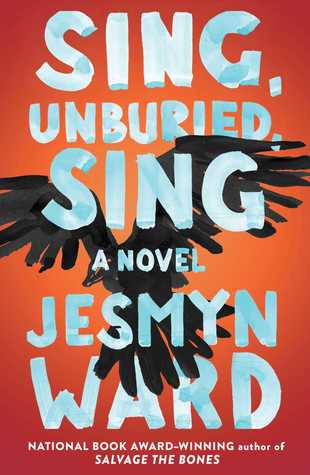Interview with 2018 NBCC Fiction Award Finalist Jesmyn Ward
For the past four years, the National Book Critics Circle has partnered with The New School’s MFA Creative Writing program, allowing the students to interview each of the NBCC Awards Finalists. In addition to building excitement for the Awards Finalist Reading and Ceremony held at the New School March 14th-15th, these interviews have built an intergenerational bridge between the writers of today and tomorrow.
This year, as part of the ongoing collaboration, and in support of the NBCC’s conversation about reading, criticism, and literature that extends from the local to the national, Brooklyn Magazine will publish and promote the interviews between NBCC Finalists and the current students of The New School.

Jesmyn Ward tells stories that will haunt you. She is a two-time winner of the National Book Award for Fiction and is currently a finalist for the 2018 National Book Critics Circle award for Fiction for her latest novel, Sing, Unburied, Sing (Scribner). In Sing, Ward tells the heart-wrenching story of a Mississippi family whose past and present lives are tearing them apart. Unburied spirits arise to tell stories untold.
The creativity found in Sing, Unburied, Sing is astounding in not just its veracity, but also its delivery. From multiple points of view, including a ghost’s, to entire stories told in italics, I spoke with Ward on the process of creating the spellbinding literary labyrinth that is Sing, Unburied, Sing, as well as her upcoming novel.
My favorite part of Sing, Unburied, Sing is how each character is a storyteller. Leonie tells the story of Given, Jojo the story of Richie, Richie the story of Pop. This is inviting to the reader because the stories of each character quickly become the lore of the world. The way these stories are delivered, though, is incredibly experimental. I wondered how the italics for Pop’s story worked its way into such prominence in the novel.
You know, trying to figure out how to incorporate Pop’s stories into the present-day narrative from Jojo’s point of view was very difficult. It was something that I had to work at for a while. From the beginning, they were in italics. There was something about letting Pop’s voice speak in those italicized sections that worked.
After I wrote the first draft, I revised ten or twelve times and then showed it to my editor. She said, “Well, this isn’t working as well as it could. Have you thought about maybe changing the italicized sections? Like trying to incorporate them more into the story? Maybe take them out of italics and give them more context beforehand to lead into those sections.” And I tried! I played around with those sections a bit but it wasn’t working. Changing those sections, taking them out of italics, giving them more context beforehand weakened Pop’s voice.
I threw those sections back out, put them back in italics, and tried to do more transitions leading into those sections so the reader was more aware of the fact that Jojo was thinking again about this story, and for some reason he’s not saying why. I don’t even think he understands why he’s drawn to it again and again. He’s just drawn to the telling of it. I tried to balance it through the narrative. I had to look at every chapter where Pop tells this story. Every Jojo chapter, I made sure that we spent enough time with Jojo in the present so that the flashbacks of the past into Pop’s voice worked. So that no chapter is lopsided.
I will tell you something that I haven’t told anyone else: originally there were no Richie sections but there were bits that were told from Richie’s point of view and they were also in italics. And that just definitely didn’t work because it was just too jarring for the reader.
When I was working on the rough draft and figured out who Richie was and that Richie would be a character in the story I thought, “maybe I’ll write some sections from his point of view,” and then my editor came to me and asked, “have you ever thought about writing some of this from Richie’s point of view and taking it out of those italicized sections?” It wasn’t easy, but it worked better. It made the story.
The multiple POV approach to each chapter I believe is really tested much later in the book by the Richie sections coming into fruition. The Richie sections came in around 130 pages into the book, right?
I tend to revise in a way that other people may think is slow or doesn’t make sense. What I do is focus on one thing [at a time] in each revision. That’s the reason why I have so many.
In one revision, I just concentrate on Richie throughout the entire draft. I go from the first page until the last page just doing that, because if I try just move chapter by chapter, completely revising everything, I’m going to miss something.
I will say that I actually had some trouble because I wasn’t really aware of how often I was using italics in the novel. I was overusing italics and complicating things. The text, in some places, was difficult to read because I wasn’t giving the reader some sort of template so that they could understand—so when she’s using italics, this is what’s occurring—that needed to be clearer and more purposeful. That was another thing I had to go through in the revision.
There is this gradual learning curve I noticed that happens throughout the book, which ultimately leads up to a complex final scene with the character Mam, where the entire cast is brought together for this collective, cluster of catharses.
That was a really difficult scene to write—at least in the first couple drafts and revisions. I had written scenes where multiple characters were present but I felt like there was too much going on.
I did a really substantial rewrite of that chapter later on in the revision process. Something around the sixteenth revision. When I am writing the rough draft, I try not to think about any of this. I have multiple books on writing, multiple books that break writing down to its craft components. I teach creative writing, so I have all of this knowledge of the “building blocks of writing” in my head; but I feel like if I keep that all in the forefront of writing, I won’t write that first draft because I’m not opening myself up to what inspires us to tell stories.
On a recent PBS interview you did, they said briefly at the end of the interview that you are writing this new novel about New Orleans in the 1800s and the slave trade.
It’s really slowly coming along. I took a break from writing it when I went on book tour for Sing in September. Now I’m returning to it, doing some research, and still in the early chapters. In part because it’s a very different book from what I’ve written, I learned how to research and how to incorporate what I’ve learned from my research into fiction when I wrote Sing. But now it’s completely different because it requires so much more research. I definitely think I’m challenging myself because I am a little afraid. I’m questioning whether or not I’m going to be able to do this, and do it well, and of course I feel that responsibility to do it well because of who I’m writing about.
Was there a similar sense of responsibility when writing Sing?
Yes. It is difficult, psychologically, to sit with these characters in this moment, and to recreate what was basically torture. It’s psychologically taxing and so again, it’s taking me much longer to write this rough draft because it’s hard to sit for an extended amount of time with these characters and render that experience physically on the page.
Is that responsibility to write these difficult subjects where your fears and anxieties stem from?
I think there’s an added anxiety to it because of this awareness that in my writing, I’m bringing these people, these characters that I write about, into a place that they’ve been erased from. That’s important and I feel a certain sense of responsibility to do a good job as a writer, to write them compellingly, and make them real for the reader so that they will stay with reader when readers are done with the book.
There’s also this pressure that even though I’m making these people up, they’re based on real people that suffered in very real ways. I think that adds another weight too because I want to honor that.
You might also like 


























